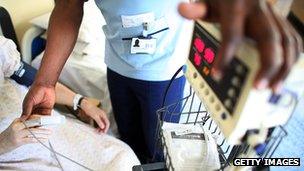More than 1.3 million diabetes patients not offered vital tests
- Published

Diabetes patients should undergo nine different health checks every 12 months
An estimated 1.3 million diabetes patients are missing out on vital and potentially life-saving health checks, the BBC has learned.
NHS figures reveal fewer than 10% of patients are offered the full series of tests in some areas of England.
Health Minister Paul Burstow said the situation was "outrageous" and "unacceptable".
Primary care trusts in low test areas said they were working to improve services for diabetes patients.
According to National Institute for Clinical Excellence, external (NICE) guidelines, primary care trusts (PCTs) should ensure all diabetic patients are given a series of nine different health checks every 12 months.
These include blood pressure, blood glucose levels, cholesterol, and examinations of the eyes and feet.
The tests are designed to spot the early signs of complications linked to diabetes such as infection leading to gangrene, blindness, kidney failure and heart problems.
The tests are meant to help diabetes patients like bricklayer Will Hogan, 60, to spot potential health risks exacerbated by their diabetes.
Mr Hogan had to have his left leg amputated in August 2011 when an ulcer on his foot became infected.
Diabetes patients speak about their amputations and the need for patients to undergo regular health checks.
"Since the amputation, I can't get around like I could and I will never work again. It is just a nightmare," he told Radio 4's File on 4 programme.
Mr Hogan believes everyone should be given the full series of tests.
But although doctors in some areas are testing more than 60% of patients, the National Diabetes Audit, external for England shows scores of trusts are failing to give all nine tests to even half their diabetes patients and some are testing fewer than 10%.
Minister of State at the Department of Health, Paul Burstow, told File on 4: "It's outrageous, it's unacceptable, and that's why we published the information that exposed this in the first place."
He added: "The guidance is there, the best practice is understood and we need to make sure that best practice is adopted."
'People dying'
But despite the minister's pledge, Baroness Young, Chief Executive of Diabetes UK, said systematic changes were needed to ensure health care professionals could focus on early intervention.
"The government often says the right things but the stark fact is that people are dying and suffering a dramatically reduced quality of life as a result of lack of political will," she said.
"This is one of the few problems facing the government that does not require more investment.
"Health professionals are constantly telling us how frustrated they are about the constraints the system places on them and we want the government and the NHS to give them the tools they need."
More than 967,000 diabetes patients were not given all nine tests, according to figures given to the BBC by the National Diabetes Audit for England.
According to Dr Bob Young, the clinical lead of the audit, the figure could be more than 1.3m if the picture in England is echoed across the UK.
Mid-Essex Primary Care Trust (PCT) came bottom of the league table for comprehensive testing in England. Swindon PCT was also near the bottom of the table. Both trusts gave all nine tests to fewer than 10% of diabetes patients.
A spokesman for Mid-Essex PCT said the trust was in the mid-range for seven out of the nine health care tests, but that it appeared information on the other two tests had not been "captured" by the audit. Mid-Essex PCT says it is making a number of improvements to diabetic care.
A statement from Swindon PCT said: "In eight out of nine areas the figures show we are testing more than 70% of our patients.
"We have written to all GPs to make sure a standardised approach is put in place to ensure patients have all the health checks."
Dr Stephen Lawrence of the Primary Care Diabetes Society , externalsaid the low comprehensive test rates could be due to the increasing numbers of patients being diagnosed with the condition.
But he added some trusts needed to reorganise how care was delivered.
"It is a concern if patients are developing complications and suffering when all it needs from our point of view is a reorganisation of the services," he said.
Listen to the full report on File on 4, external on BBC Radio 4, external on Tuesday, 21 February at 20:00 GMT and Sunday 26 February at 17:00 GMT. Listen again, external via the Radio 4 website, external or download the podcast, external.
- Published14 December 2011
- Published14 November 2011
- Published4 November 2011
- Published7 October 2011
- Published3 October 2011
- Published24 August 2011
- Published29 June 2011